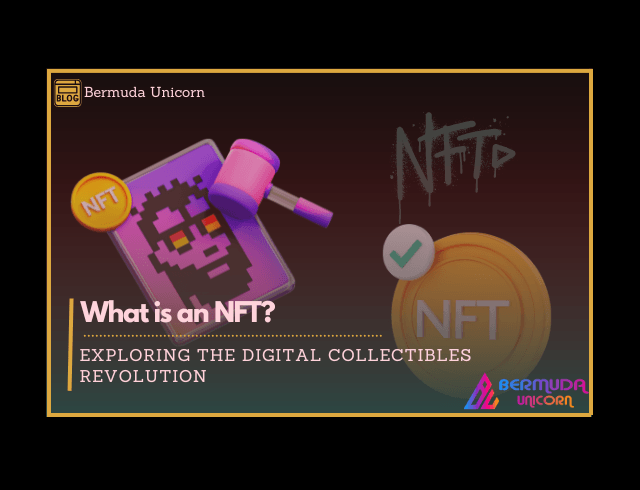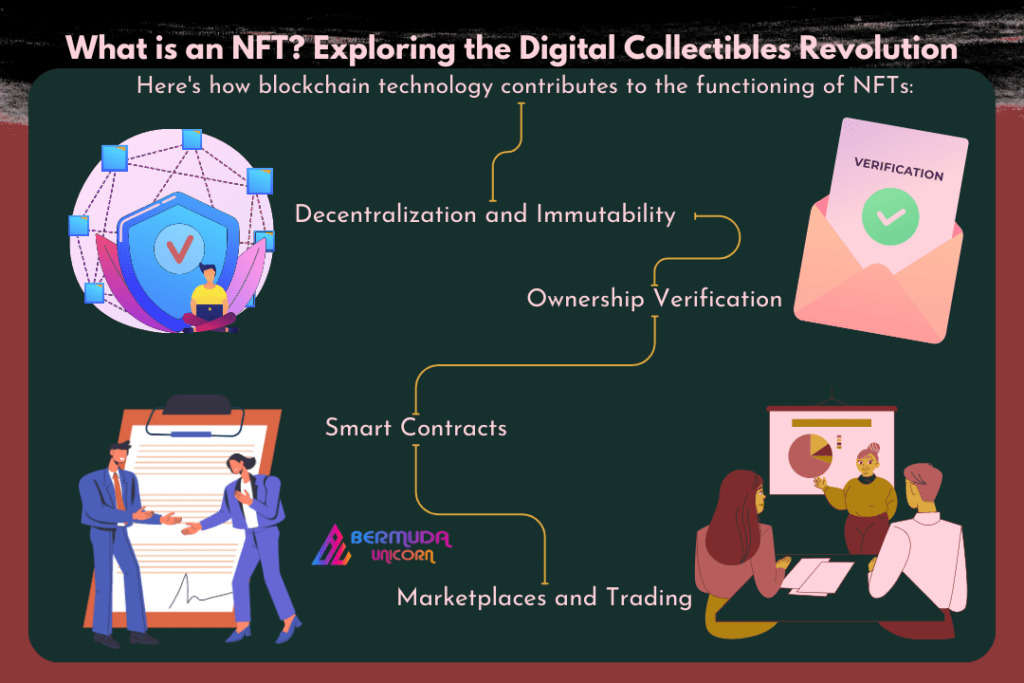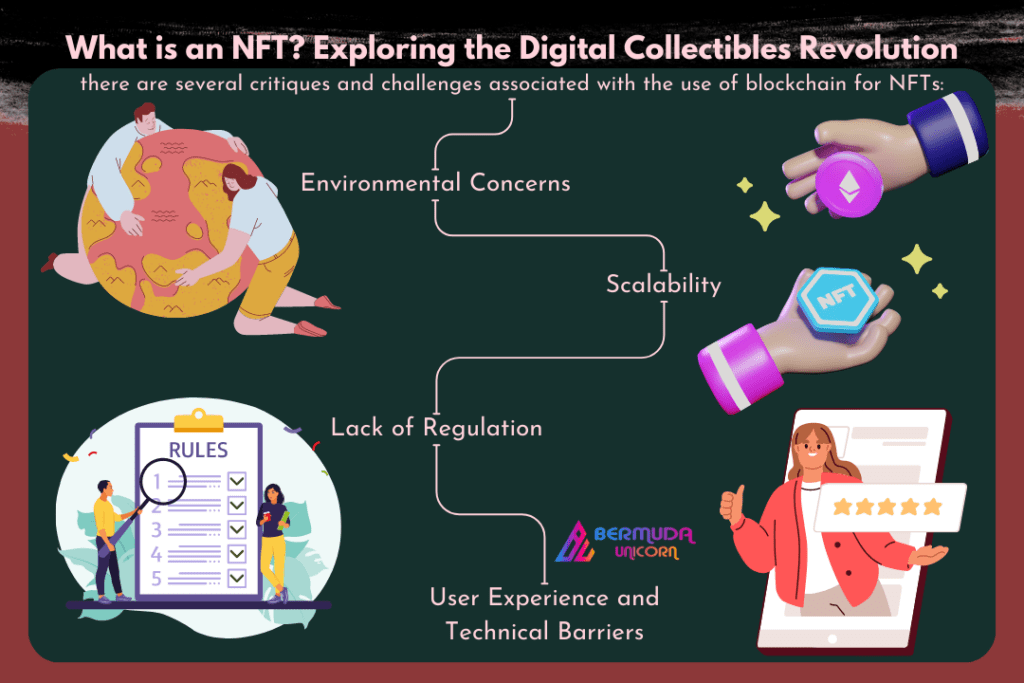![]()

What is an NFT ? – The rapid evolution of the digital world is giving rise to new trends and technologies at an unprecedented pace. Among these trends, the ascent of NFTs, or Non-Fungible Tokens, has captured the attention of the art, entertainment, and tech industries. But what are NFTs exactly, and why is their emergence generating such excitement? In this blog post, we will delve into the realm of NFTs to clarify their concept and examine their influence on how we understand ownership, creativity, and digital assets.
Understanding NFTs: The Basics
At its essence, an NFT embodies a digital asset that utilizes blockchain technology to signify ownership or authenticate a one-of-a-kind item or content. In contrast to cryptocurrencies like Bitcoin or Ethereum, which possess interchangeability and can be traded on a one-to-one basis, NFTs exhibit non-fungible traits, indicating that each token possesses unique attributes that distinguish it from its counterparts. This distinctiveness is the pivotal factor that renders NFTs exceptionally suitable for embodying digital art, collectibles, music, virtual real estate, and even tweets.
The Role of Blockchain

The world of NFTs relies heavily on blockchain, the foundational technology of cryptocurrencies. A blockchain serves as the foundation for each NFT, offering a transparent and secure record that validates the ownership and chronological record of transactions involving the digital asset. This technological framework guarantees the impossibility of duplicating, counterfeiting, or altering NFTs, instilling creators and collectors with a sense of assurance regarding the genuineness of their digital assets.
Creating and Owning NFTs
Creating and possessing NFTs encompasses several sequential stages. Initially, a creator, be it an artist, musician, or content originator, has the capability to mint an NFT through the action of uploading their digital creation onto an NFT platform. This operation generates an exclusive token that symbolizes that distinct content element. Subsequent to minting, the NFT becomes available for purchase, sale, and exchange on assorted digital marketplaces tailored to NFT transactions. Collectors are empowered to procure NFTs utilizing cryptocurrencies, and the data pertaining to ownership is indelibly inscribed onto the blockchain.
NFTs and Digital Ownership
In the digital age, NFTs have ignited a paradigm shift in our understanding of ownership. Previously, digital content’s ease of replication and sharing posed difficulties for artists and creators aiming to monetize their creations. Through NFTs, however, creators can now maintain ownership and secure a portion of subsequent sales, even as their digital artwork undergoes transfers. This groundbreaking concept not only empowers creators to forge a direct link with their audience but also enables them to establish enduring income streams.
Critiques and Challenges

Despite the new opportunities presented by NFTs, they also encounter criticism and challenges. Environmental concerns emerge as blockchain networks consume substantial energy, prompting inquiries into the carbon footprint of NFT transactions. Furthermore, the hype surrounding NFTs has generated an influx of subpar and plagiarized content, thereby diminishing the technology’s value.
The Future of NFTs
As the technology continues to develop, NFTs possess the capacity to overhaul industries beyond the realm of art and entertainment. Ranging from virtual real estate within the metaverse to the tokenized ownership of tangible assets, the potential is extensive. The progression of standards and regulations will hold a pivotal role in shaping the integration of NFTs across diverse sectors.
In summary, NFTs embody a captivating convergence of technology, art, and economics. As our exploration of NFT potential persists, it remains essential to weigh their advantages against the challenges they pose. Whether you’re an artist in search of fresh channels for creative outlets or an investor aiming to participate in the digital collectibles sphere, grasping the concept of NFTs stands as a vital stride toward navigating this ever-evolving terrain.
Frequently Asked Questions (FAQs)
1. What is a NFT?
An NFT, which stands for Non-Fungible Token, serves as an exclusive digital proof of ownership for items such as art, music, and virtual assets. Its foundation lies in blockchain technology, setting it apart from cryptocurrencies like Bitcoin.
2. What can be turned into an NFT?
NFTs can represent various digital content, from art and music to virtual real estate and tweets.
3. How do NFTs work?
NFTs are created by ‘minting’ them on blockchain platforms. This involves uploading content, generating a unique token, and recording ownership details on the blockchain.
4. Why is blockchain important for NFTs?
Blockchain ensures the security and authenticity of NFTs by preventing duplication or tampering and recording ownership history transparently.
5. Where can I buy NFTs?
You can buy NFTs on online marketplaces specializing in NFT transactions. One such platform is Bermuda Unicorn, known for its diverse NFT collection and user-friendly interface.
6. Can I sell or trade NFTs?
Absolutely. NFTs are designed for easy selling and trading. Bermuda Unicorn and similar platforms offer seamless trading experiences.
7. Are NFTs environmentally friendly?
NFTs have raised concerns due to blockchain energy usage. Efforts are being made to develop more eco-friendly solutions.
8. Are NFTs just for digital art?
No, NFTs have broader applications, including virtual real estate, collectibles, music albums, and more.
9. Are NFTs a good investment?
NFTs can be speculative investments. Their value depends on factors like content rarity, creator reputation, and market trends.
10. What’s the future of NFTs?
NFTs could reshape ownership concepts, empower creators, and expand into industries like gaming and virtual reality. Staying informed, especially about platforms like Bermuda Unicorn, is crucial as the NFT landscape evolves.
Final Thought
NFTs have swiftly risen as a transformative trend, blending technology, creativity, and ownership in the digital realm. Enabled by blockchain, they empower creators, collectors, and investors, disrupting traditional concepts of ownership. While NFTs unlock new opportunities, challenges like environmental impact and content quality require scrutiny. Amid this dynamic landscape, platforms like Bermuda Unicorn shape the future of NFTs, illustrating the convergence of technology and artistry.
